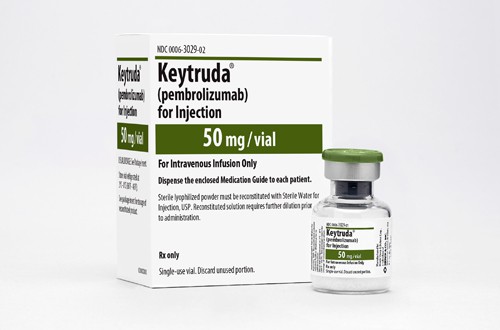
Merck & Co has submitted a marketing application for its anti-PD-L1 therapy Keytruda as a treatment for non-small cell lung cancer (NSCLC) in the US.
The marketing application – filed several weeks after rival checkpoint inhibitor Opdivo from Bristol-Myers Squibb (BMS) was approved by the US regulator for NSCLC – comes as both companies reported impressive new clinical trial results in NSCLC.
Merck is seeking approval of Keytruda (pembrolizumab) as a treatment for NSCLC patients whose cancer has progressed despite platinum-containing chemotherapy and an FDA-approved therapy for EGFR or ALK mutations, if present.
Merck said the filing was based on updated results from the phase Ib KEYNOTE-001 study, which enrolled 313 treatment-naïve and treatment-experienced patients with advanced NSCLC. The new data reveal an overall-response rate (ORR) of 45% in patients whose tumour cells tested at least 50% positive for PD-L1 expression.
The company’s application is accompanied by a filing for approval of an Agilent diagnostic kit that detects PD-L1 expression and can help identify patients who will benefit from therapy with its drug.
In KENOYTE-001, “NSCLC patients whose tumours express PD-L1 in the majority of their cells experienced the highest response rates to Keytruda treatment,” commented Roger Perlmutter, president of Merck Research Labs.
The results “indicate that tumour PD-L1 expression may be a relevant biomarker to identify patients more likely to have higher rates of response to Keytruda,” he added.
Keytruda has breakthrough designation from the FDA in NSCLC, and the agency now has 60 days to decide whether it will accept the application for review.
Opdivo trial halted early
Meanwhile, BMS said ahead of the weekend that it had decided to stop the phase III CheckMate-057 trial of Opdivo (nivolumab) early after an independent data committee concluded it had achieved a significant increase in overall survival compared to control.
BMS said this was the second trial to show a survival advantage for Opdivo in lung cancer and that it “looks forward to sharing these data with health authorities soon,” putting the company another step ahead of Merck in the NSCLC indication.
CheckMate-057 was an open-label trial comparing Opdivo to docetaxel in 582 patients with previously treated, advanced or metastatic non-squamous NSCLC.
Merck’s drug was the first checkpoint inhibitor to be approved in the US, getting a green light from the FDA last year as a second-line treatment for melanoma, a few weeks ahead Opdivo in the same indication.
The checkpoint inhibitors are on the leading edge of a new wave of immuno-oncology therapies in cancer and are expected to become blockbusters with sales of several billion dollars a year apiece, although some analysts have started to scale down forecasts for the class as a whole.
Merck has also just published the results of the KEYNOTE-006 trial comparing Keytruda to BMS’ CTLA-4 inhibitor Yervoy (ipilimumab) in the first-line treatment of melanoma – first reported last month – in the New England Journal of Medicine. Merck’s drug improved overall survival by more than 30% compared to BMS’ drug.
The company intends to file for approval of Keytruda as a first-line therapy for melanoma in the US and elsewhere around the word from mid-2015.
The KEYNOTE-006 data were presented over the weekend at the American Association for Cancer Research (AACR) annual meeting in Philadelphia, along with preliminary data from the company’s KEYNOTE-028 trial in 20 different cancer types.
Preliminary data from the latter trial revealed that Keytruda achieved a 28% ORR in patients with the head-to-treat lung lining cancer pleural mesothelioma, with more than three quarters of patients achieving disease control.




